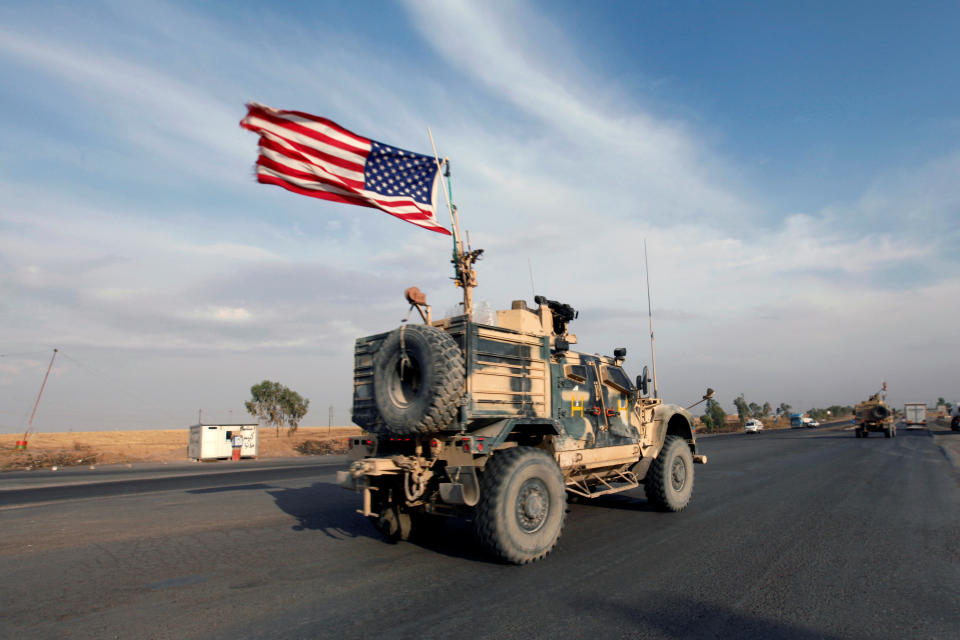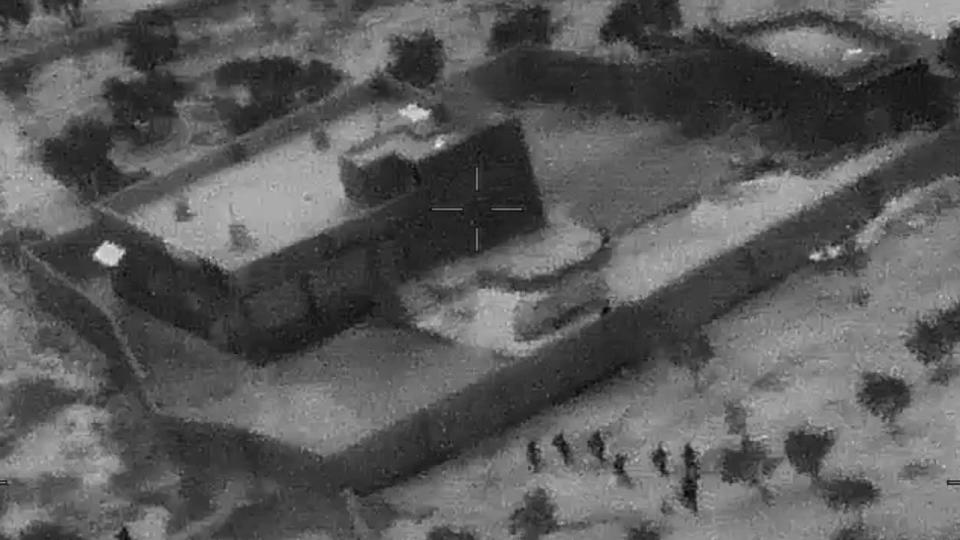'We could be blind': Syria pullout may result in loss of intelligence from the Kurds
WASHINGTON — A U.S. withdrawal from Syria will strain the links that the U.S. intelligence community has painstakingly built with both Iraqi and Syrian Kurdish forces, according to current and former government officials with long experience in the Middle East.
Just as Iraqi and Syrian Kurdish militias were central players in the U.S.-led coalition’s campaign to destroy the Islamic State group’s physical caliphate, the Kurds also provided critical intelligence to their U.S. counterparts.
“The intel that we’re getting from the Kurds is incredible,” said a former U.S. government official with close ties to the group, whose population spans Turkey, Iran, Iraq and Syria. As an example, he cited the Oct. 26 raid that led to the death of Islamic State leader Abu Bakr al-Baghdadi, which he said was based on Kurdish intelligence. “That was the Kurds,” he said. (The New York Times reported that Syrian and Iraqi Kurds provided crucial intelligence for the raid.)

A U.S. withdrawal from Syria would place the United States’ ability to get such intelligence at risk and could result in the compromise of some U.S. intelligence techniques, according to current and former government officials.
“The viability of a long-term intelligence relationship with the Syrian Kurds will certainly be challenged by the extension of Syrian government control east of the Euphrates River,” said a senior Defense Department official, who like other sources for this story insisted on speaking anonymously in order to discuss sensitive intelligence issues.
“We could be blind, especially if we’re not cultivating those relationships in eastern Syria,” said a former U.S. government official with close ties to the Kurds.
“We’ve had an excellent relationship with the Kurds, and particularly in Syria,” said the senior Defense Department official. “They, over the last several years, have been an extremely valuable partner in gathering human intelligence on the ground — the things you can’t learn from ISR [intelligence, surveillance and reconnaissance aircraft]. The future of that relationship … is going to be challenged by not having routine direct access to them.”

But a former senior U.S. intelligence official said that while the departure of U.S. forces from Syria would affect collection, it would nevertheless be possible for U.S. intelligence officers in nearby countries to maintain a relationship with Kurdish officials in Syria. Those officers are experienced in running operations in war zones and other hostile operating environments from long distances, he said.
But the value of having U.S. intelligence officers collocated with their Syrian counterparts and sources is impossible to replicate from afar, according to a former senior U.S. military intelligence officer. “From a human perspective there is no substitute for presence,” the former officer said. “A loss of presence in that area is a loss. You just can’t make that up through remote means.”
Another risk for U.S. intelligence is that the withdrawal has forced the Kurdish-led Syrian Democratic Forces into marriages of convenience with the Bashar Assad regime and the Russian forces that have helped it cling to power. Russian, Syrian or even Iranian forces might be able to persuade or force Kurdish officials to share what they’ve learned from their erstwhile American partners with the Russians or even the Iranians, according to former U.S. officials.
“It is possible that details of U.S. modus operandi could be passed to U.S. adversaries, which could impact operations in other environments,” said the former senior U.S. intelligence official. In other words, if individual Kurds informed the Russians or the Iranians about how the United States ran intelligence operations in Syria, that might help them identify American espionage operations elsewhere.
“How do you make scrambled eggs in one location?” the former senior U.S. intelligence official said. “Well, you probably make it the same way somewhere else.”
However, the former senior intelligence official was careful to not overstate the counterintelligence risks inherent in a U.S. withdrawal, and stressed that U.S. intelligence officers took steps to mitigate such risks in any combat zone.

Others said they had too much faith in the Kurds to believe that many of them would betray the Americans. “They’re always going to be transactional, but I don’t necessarily think that means they’re going to be willing to sell us out or cooperate fully with the regime or the Russians,” said the senior Defense Department official. The press office for the Syrian Democratic Forces did not respond to an email seeking comment.
The U.S. intelligence community’s links to the Kurdish factions, particularly the two main Iraqi Kurdish parties, the PUK and the KDP, stretch back to before the 1991 Gulf War, according to current and former U.S. officials. “Those entities deal with the CIA because of strong personal relationships developed over decades,” said a former U.S. intelligence official.
Since its 2003 invasion of Iraq, the U.S. military, and its Special Operations forces in particular, have built upon those foundations laid by the CIA, according to the former U.S. government official with close ties to the Kurds. The Army’s Delta Force — the same unit that conducted the raid to get al-Baghdadi — used Kurdish spies nicknamed “Mohawks” as part of its counterterrorism campaign against al-Qaida in Iraq and other insurgents.
The United States also used Kurdish assets in its attempts to learn more about Iran’s nuclear program, according to the former U.S. government official with close ties to the Kurds.
But other sources either declined to discuss this topic — “I don’t want to get into that,” said the senior Defense Department official — or cast doubt on the assertion. “It is unlikely the Kurds can provide significant information on the Iranian nuclear program,” said the former senior U.S. intelligence official.
U.S. special operators and intelligence officers also built relations with Syrian Kurds during this period. The Syrian Kurds’ population base in the eastern part of the country near the Iraqi border meant they were ideally placed to report on members of Saddam Hussein’s regime fleeing the U.S. invasion. “When Saddam and all of his Baath Party were bailing into Syria, where do you think we were getting a lot of that information from?” said the former U.S. government official with close ties to the Kurds.

When the Islamic State rose from the ashes of al-Qaida in Iraq to sweep across a large swath of Syria and Iraq in 2014, U.S. intelligence and Special Operations forces turned once again to the Kurds in an effort to stem the Islamist tide. While the Kurdish militias, particularly the YPG (later renamed the Syrian Democratic Forces) in Syria, played a vital role in the fight against the Islamic State and bore the brunt of the fighting, Kurdish human intelligence has also been key to the U.S.-led coalition’s success, according to current and former U.S. officials.
“They have given the kind of intelligence that we at times get from Israeli intelligence,” the former U.S. government official said. (The former senior U.S. intelligence official disagreed, saying Kurdish intelligence organizations may not be on par with spy agencies like Israel’s Mossad, “but they don’t need to be — they just need to handle the issues important in their world, and this makes them a unique and powerful ally.”)
The Kurds have several advantages that make them valuable intelligence partners for U.S. intelligence. One is their location. “Kurds deeply understand their world and their neighborhood,” said the former senior U.S. intelligence official. “They have linguistic, cultural and even familial relationships, which benefit their ability to understand regional events.”
The Kurds were able to alert U.S. officials to nuances that otherwise would have escaped their attention. “It was their eyes and ears on the ground, looking at the tactical situation, being culturally aware of things that would frankly get by us,” said a former senior U.S. military intelligence officer.
Although Syria’s Kurds are clustered in the northeast, they have contacts throughout the country, according to the former U.S. government official with close ties to the Kurds. “They all went to university in Homs and Damascus,” the former official said. “It’s pretty amazing the information they can get.”
The U.S. intelligence relationship with the Iraqi Kurds will suffer if the latter perceive that the United States is abandoning its Syrian counterparts, according to the former U.S. government official with close ties to the Kurds. The former senior U.S. military intelligence agreed, saying that the withdrawal “really undercuts our credibility as an ally.”
Others, however, suggested that the withdrawal, even if disappointing for the Kurds, wouldn’t ultimately be that detrimental to the U.S. relationship with Iraqi Kurds.
“I do not think it will have any significant or discernible effect on our relationship with our Iraqi Kurdish partners,” said the senior Defense Department official.
It may be that no matter what happens in Syria, the Iraqi Kurds will continue to cooperate with U.S. intelligence out of pragmatism and loyalty.
“The Iraqi Kurds have been through it all, and they will help,” said a former intelligence officer. “Just because Trump is an idiot, they aren’t turning off the spigot.”
Jenna McLaughlin contributed reporting to this story
_____
Download the Yahoo News app to customize your experience.
Read more from Yahoo News:



